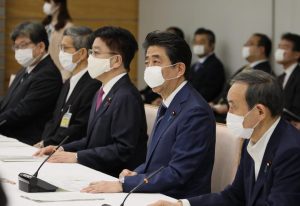As of late May, it appears that Japan started getting over the hump of the first wave of the COVID-19 pandemic. The country has contained the deaths below 1,000 in total, making the death rate per capita one of the lowest in the world. The daily new cases have decreased to less than 100 on average since the second week of May, which allowed the government to lift the national state of emergency.
Despite the relative lull in infections Japan has been going through, a majority of the public is dissatisfied with the government’s handling of the crisis. The approval rating of Prime Minister Shinzo Abe’s Cabinet sunk to 27 percent in May, one of the lowest rates in two years, according to an opinion poll conducted by Mainichi newspaper. Another survey by Asahi Shimbun showed that nearly 60 percent of respondents felt that Abe did not demonstrate leadership in the crisis, while 33 percent felt otherwise.
Indeed, Abe and his cabinet have repeatedly flipflopped in their response to the crisis. A good example of the muddling is the emergency declaration announced on April 7, which came only after the Japan Medical Association had pleaded for the measure several times, warning that the medical system was in critical condition. Additional pressure came from Tokyo Governor Yuriko Koike, who warned that the metropolis was at a critical moment in its pandemic response one week before the emergency was declared. In the Asahi Shimbun survey, only 18 percent of respondents felt that the timing of the emergency declaration was “appropriate,” while a full 77 percent thought it was “too late.”
Initially, the declaration targeted only seven of the 47 prefectures, with measures limited to voluntary business closures. Governors in other prefectures, including Aichi, Fukui, Ishikawa, and Kagawa, which were excluded from the government’s original list, began issuing their own declarations as local case numbers continued to rise. On April 18, the total number of confirmed COVID-19 cases in Japan passed 10,000, doubling in the 10 days since the declaration. Bowing to pressure, Abe expanded the declaration nationwide on April 16 and extended it for another month on May 3, although it was eventually lifted before expiring.
Another example of the perceived lack of leadership is the government’s handling of the emergency cash handout program, announced as part of the “Emergency Economic Measures for Response to COVID-19.” Abe advertised the package as worth “108 trillion yen [$1 trillion], equivalent to 20 percent of our GDP,” but critics said this figure was “deceptive” as the amount included large miscellaneous expenses and payment grace for social insurance. Initially, payments under the program were set at 300,000 yen ($2,800) for households in need. However, this was criticized as being too limited in scope. For example, applicants had to prove at least a 50 percent salary decrease due to the COVID-19 outbreak. Pensioners, homeless people, and people living on welfare benefits were ineligible. In response to the criticism, Abe amended the program and announced a 100,000 yen flat rate for all people in the Japanese Resident Registration System on April 16.
Perhaps the most highly criticized part of the government’s response is a plan to distribute two reusable cloth masks to every man, woman, and child in Japan. The hefty price tag of 46.7 billion yen provoked ridicule, with people coining the term “Abenomask,” mocking the prime minister’s most famous economic policy known as “Abenomics.”
Despite the public’s negative opinion of the government’s handling of the crisis and the free-falling approval rating, Abe continues his tenure as the longest-serving prime minister in Japanese history by far. The monthly opinion poll of Japanese public broadcaster NHK reported that the main reason cited for supporting the cabinet is that it is “better than the others” (55 percent), outdistancing the next most popular response: that respondents supported the parties leading the cabinet (14 percent). In other words, the majority supports the cabinet not because they are satisfied, but because no alternative is available.
Abe’s Liberal Democratic Party (LDP) has ruled Japan for almost 65 years except for two brief hiatuses (from 1993 to 1994 and 2009 to 2012). Experts, including political scientist Takashi Mikuriya and Tokyo University professor Masaki Taniguchi, consider current support for the cabinet mainly as a reaction to the failure of the Democratic Party of Japan (DPJ), which held power in the latter hiatus. The DPJ not only failed to fulfill campaign pledges such as the relocation of U.S. military bases in Okinawa to outside the prefecture, but also suffered from scandals like allegations of illegal campaign contributions to Prime Minister Yukio Hatoyama. Mikuriya thus pointed out that Hatoyama’s successor, Abe, “won by default.” Indeed, this resonates with the results of a Mainichi survey, in which the ruling LDP gained the support of 25 percent, while the largest opposition party, the Constitutional Democratic Party of Japan, consisting of many DPJ members, obtained only 12 percent.
Although public dissatisfaction with the government’s response to the outbreak surges, most are still convinced that the status quo is the best option. The response, which is hardly a success in the public’s eye is hardly a failure for Abe himself, at least in comparison with his competitors, even though his approval ratings hit a low point amid the crisis. It is perhaps this passive but solid preference for the cabinet due to the lack of alternatives that is the problem at the heart of Japanese politics, which the pandemic is exposing.
Yusaku Yoshikawa is a member of staff at JIN Corporation and is currently engaged in Japanese Official Development Assistance (ODA) Projects in Africa. He completed his Master in Development and Rural Innovation majoring in anthropology at Wageningen University and Research, the Netherlands.
































